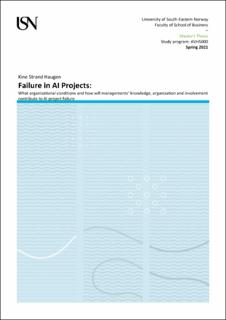| dc.contributor.advisor | Leminen, Seppo | |
| dc.contributor.author | Haugen, Kine Strand | |
| dc.date.accessioned | 2021-09-27T16:12:54Z | |
| dc.date.available | 2021-09-27T16:12:54Z | |
| dc.date.issued | 2021 | |
| dc.identifier | no.usn:wiseflow:2613763:44363626 | |
| dc.identifier.uri | https://hdl.handle.net/11250/2783842 | |
| dc.description.abstract | Artificial Intelligence (AI) has become a widely used term in the business world in recent times and is one of the most groundbreaking technologies being developed today. In recent years, companies have favored to see the benefits and opportunities of using AI to improve their business processes. This master thesis will take a closer look at the problems with AI projects failing. A literature review that was done prior to the master’s thesis showed that there is little research on the phenomenon and that there is a need for further research into the reasons behind why so many AI projects are failing. This study will have a look at how managers' knowledge and involvement in AI projects affect the success rate, how companies' organization and organizational conditions will contribute to the failure of AI projects. This is a qualitative study where in-depth interviews have been conducted by a selection of informants with a background in Data Science, consulting, and research. The approach is exploratory where the purpose was to uncover both known and unknown reasons why AI projects fail. The results from the study show many of the same findings that have been made in previous studies. The main findings from this study are 1) lack of knowledge among managers, 2) poor handling of the data and 3) poor planning and organization of AI projects. The findings show that there is a need for more knowledge about the AI technology and the areas of user applications among managers in Norwegian companies. Managers have unrealistic expectations of their own data and what AI can do for their business. There is also a lack of how the business needs should be communicated to the project team when the management lacks technology understanding, and the team does not understand what needs the problem should meet for the business or the customer. Managers lack knowledge of how much resources and preparation that must be done in advance before the project can start. The same applies in the operational phase where managers do not know that they must have extra resources for monitoring and maintenance in the aftermath of implementation. An AI project is an exploratory process where there is a need for an acceptance for failing and that it contributes to learning and improvement of processes. AI projects will also need more AI-friendly methodologies that support the interdisciplinarity and complexity of an AI project rather than the sequential methods most commonly used today. | |
| dc.description.abstract | Artificial Intelligence (AI) has become a widely used term in the business world in recent times and is one of the most groundbreaking technologies being developed today. In recent years, companies have favored to see the benefits and opportunities of using AI to improve their business processes. This master thesis will take a closer look at the problems with AI projects failing. A literature review that was done prior to the master’s thesis showed that there is little research on the phenomenon and that there is a need for further research into the reasons behind why so many AI projects are failing. This study will have a look at how managers' knowledge and involvement in AI projects affect the success rate, how companies' organization and organizational conditions will contribute to the failure of AI projects. This is a qualitative study where in-depth interviews have been conducted by a selection of informants with a background in Data Science, consulting, and research. The approach is exploratory where the purpose was to uncover both known and unknown reasons why AI projects fail. The results from the study show many of the same findings that have been made in previous studies. The main findings from this study are 1) lack of knowledge among managers, 2) poor handling of the data and 3) poor planning and organization of AI projects. The findings show that there is a need for more knowledge about the AI technology and the areas of user applications among managers in Norwegian companies. Managers have unrealistic expectations of their own data and what AI can do for their business. There is also a lack of how the business needs should be communicated to the project team when the management lacks technology understanding, and the team does not understand what needs the problem should meet for the business or the customer. Managers lack knowledge of how much resources and preparation that must be done in advance before the project can start. The same applies in the operational phase where managers do not know that they must have extra resources for monitoring and maintenance in the aftermath of implementation. An AI project is an exploratory process where there is a need for an acceptance for failing and that it contributes to learning and improvement of processes. AI projects will also need more AI-friendly methodologies that support the interdisciplinarity and complexity of an AI project rather than the sequential methods most commonly used today. | |
| dc.language | eng | |
| dc.publisher | University of South-Eastern Norway | |
| dc.title | Failure in AI Projects: What organizational conditions and how will managements' knowledge, organization and involvement contribute to AI project failure | |
| dc.type | Master thesis | |
